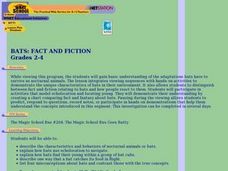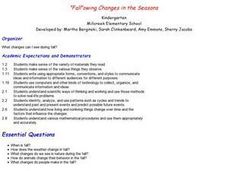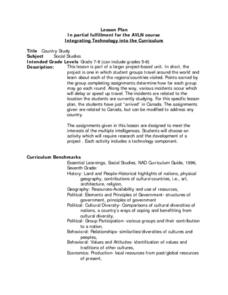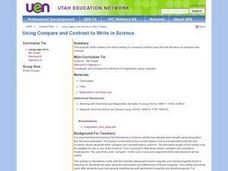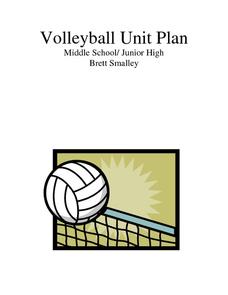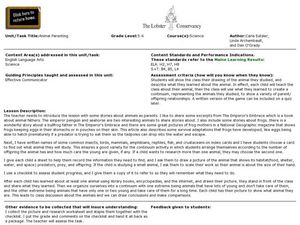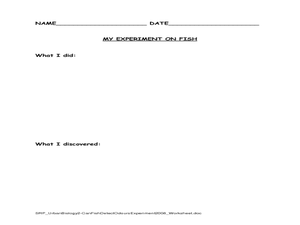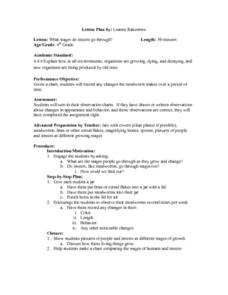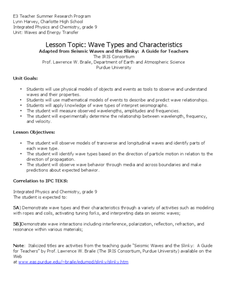Curated OER
Bats: Fact and Fiction
Students describe the characteristics and behaviors of bats. After viewing a video, they explain how bats use echolocation to navigate and how they find their young within a group. They list four misconceptions about the animal and...
Curated OER
"Fall"owing Changes in the Season
Students create a whole class A-B-"C"eason Book. Each student is responsible for creating a "letter" page relating to changes, adaptations, or other fall concepts. After hard copies of the class ABC books are created, the teachers using...
Curated OER
Social Studies: Countries and Technology
Students participate in a travel simulation and have just arrived in Canada. After choosing activities to research, they define their methods of exploration and development on plan sheets. Among the scenarios from which they choose...
Curated OER
Describe the Perfect Pathogen
Students develop a pathogen based upon their knowledge of pathogens and after presenting it to the class, they then suggest ways that the pathogen might be combated. Next they identify possible physical or behavioral changes in a...
Curated OER
Pattern
Students describe examples of the relationship between structure and function in living systems, particularly with regard to specialized tissues and organs. They describe examples of biological diversity and adaptation of organisms with...
Curated OER
Using Compare and Contrast to Write in Science
Fifth graders investigate and compare the behavior of magnetism using magnets. In this physics lesson, 5th graders write about the similarities and differences of a variety of magnet types.
Curated OER
Holy Habitats or Meet Metamorphosis
Students examine the metamorphosis of frogs and how it adapts to its environment. They research how world pollutants are effecting the amphibian population.
Curated OER
Social Studies: Classroom Culture
Sixth graders compose a list of classroom cultural values. They begin with a list of unacceptable behaviors. Each student presents two ideas they think should be part of the class culture. Students try to persuade classmates to accept...
Curated OER
Creating and Restoring Health Forests
Students explore how to create and restore healthy forests. Given a scenario, teams of students create a management plan to assist the forest in becoming healthy, safe, and appealing. Students consider the ecosystem, adaptations of the...
Curated OER
"What are these...?"
High schoolers discuss the "witches" of Shakespeare. In this literature analysis instructional activity, students research the influence of Macbeth's sisters on his behavior. They examine various terms used to describe the sisters, and...
Curated OER
Volleyball Unit Plan
From battle ball and around-the-world sit-ups to multiple variations of setting and wall-serve drills, check out this list of 29 drills, warm ups, and modified games for your next volleyball unit.
Curated OER
Ecology and the Conservation of Natural Resources
Young scholars examine the habits of various organism and evaluate the need for conserving natural resources. They role-play as migrating birds traveling between habitats encountering hazards along the way. They observe animals in a...
Curated OER
A Bearrific Home Adventure
Students and their families participate in an at home journal activity. In this journal writing lesson, students read the book If You Take a Mouse to School. Students take home a suitcase with a bear and writing elements. Students return...
Curated OER
Animal Parenting
Students analyze parenting instincts. In this parenting instincts lesson, students view a drawing of animal they studies and describe what they learned about the animal. Students teach the class about their animal and the class creates a...
Curated OER
Urban Biology: Can Fish Detect Odors
Learners investigate how fish use their sense of smell. In this scientific method lesson, students design and perform an experiment to investigate how fish use their sense of smell. This lesson includes statistical analysis and safety ...
Curated OER
Evolution
Pupils illustrate the results of natural selection by identifying the specific adaptation of an organism that allows the species to survive in that environment. They illustrate the results of natural selection by recognizing examples of...
Curated OER
Wh0-o-o-o's Out There?
Fifth graders describe the physical features of an owl and identify survival adaptations. They Investigate an owl's niche in an ecosystem. The students participate in an interactive puzzle on the internet that helps for motivation.
Curated OER
What Stages Do Insects Go Through?
Fourth graders observe mealworms over a period of time and record any changes they observe. They record any changes in color, length, behavior, and any other noticeable changes, identify the stages of the mealworms, and create a chart...
Curated OER
Termite Trails
Students observe the behavior of termites and draw conclusions about their behavior. They record data as to termite behavior and recognize elements in the experimental design which must include a hypothesis.
Curated OER
Wave Types and Characteristics
Ninth graders identify the different parts of a wave. In this physics lesson, 9th graders observe wave behavior as it travels through a boundary. They determine the relationship between wavelength, frequency and velocity.
Curated OER
Turtle Sightings
Third graders research turtles and the ways they have adapted to their marine environment. They work in groups and publish their findings using SiteMaker a web-authoring tool.
Curated OER
Spring Awakenings
Young scholars observe changes in a selected tree bud/leaf during spring. They record changes in the bud/leaf using words, pictures and numbers. They understand that trees adapt to changes in temperature, light, and moisture by sprouting...
Curated OER
Immigration in the Late 1800's
Seventh graders explore the progression of immigration patterns in the United States. They examine how immigrants perceived and adapted to the United States culture. Students discuss how immigrants were able to perserve their culture in...
Curated OER
Ethics In The Science Classroom - Fraud In Science
Students are given a fictitious case study to read in preparation for the class. This lesson can also be readily adapted for a role-playing classroom exercise. They discuss the ethical issues of the case.


